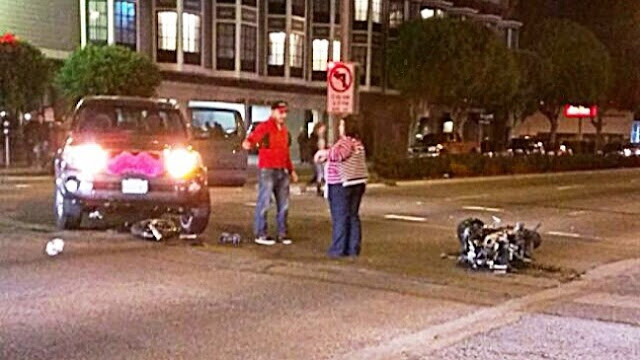SideCar CEO Sunil Paul (photo) left the vulture capital scene with a significant quote,
"We are the innovation leader in ridesharing ..." said Paul.
What makes this statement significant is that, even while going down the tubes, Paul couldn't turn off his hype machine.
He was not and is not an "innovation leader" in "ridesaharing." Not SideCar nor Lyft nor Uber have had (or have) anything to with "ridesharing" except to use the word for the purposes of double-talk, false advertising and fraud – fields in which Sunil Paul has indeed excelled as an innovator.
Ridesharing Explained
As far as I know the only real ridesharing company in California is
511.org which is a government run non-profit. The dual purpose of 511.org is fight pollution by taking vehicles off the street and allow drivers to save money by sharing the costs of a trip with their riders. In their ads for drivers to use the service, 511.org writes:
“Carpooling (i.e. ridesharing) can save you money by dividing the driving expenses between members of the carpool. You can split the costs evenly between people in the carpool or you can split expenses by how often you rotate driving duties. If everyone drives equally, no money needs to change hands. If you are strictly a passenger, you can pitch in your share for gas and other expenses.”
Contrast this with a SideCar ad for drivers,
"You drive every day. Why not get paid for it? Make extra cash and meet some awesome people by driving with SideCar! ... Some SideCar drivers are earning $22+ per hour.”
The difference between a true "rideshare" company, then, and SideCar is that a rideshare company is a non-profit and SideCar is a for-profit company - or was trying to be.
Some Advantages of Being a Non-Profit:
- Don't need to pay taxes.
- The numbers of cars wouldn't be regulated.
- Drivers would not need to be vetted.
- Cars wouldn't need commercial insurance.
- No responsibility for the welfare of their driver.
- No responsibility for the welfare of their passengers.
- Sidecar would not need to provide insurance for riders, drivers or vehicles.
Sunil Paul's Attacks on the Legal Definition of a Non-Profit
I was going to just summarize Paul's duplicitous career as high-tech charlatan but the arguments that his lawyers gave in an attempt to expand the definition of "non-profit" at the 2013 California Public Utilities Commission (CPUC) hearing are too rich not share with my gentle readers. Sidecar argued:
- “ ... the ridesharing exemption does not apply if the ‘primary purpose of those persons is to make a ‘profit’ but there is no definition or any guidance on how to interpret the term ‘profit.’”
- “By its enforcement actions and policy, the CPSD (Public Utilities Commission's Consumer Protection Safety Division) has apparently chosen to interpret essential and undefined terms such as “profit” as narrowly as possible. The CPSD’s position is that only “incremental” or “variable” profit (i.e., on a per-trip basis) should be considered; however ... a reasonable and practical construction of profit and a commercial enterprise is the total expenses of operation (i.e., the fixed and variable or aggregate costs). Simply put, there’s no profit where total costs exceed income …”
- "The ridesharing exemption under section 5353(h) provides for “[t]ransportation of persons between home and work locations or of persons having a common work-related trip purpose in a vehicle having a seating capacity of 15 passengers or less…and/or transportation that is “incidental to another purpose of the driver.... It is ... important that the phrase “the purpose of the driver” not be read too narrowly. A focus on driver’s state of mind would be so difficult to discern that it would create uncertainty and be impossible to enforce."
- My Note: Does "Work-related” means driving around while thinking about working? Or, conversely, does "non-profit" mean driving people for pay while thinking about your kids?
- Clarify and ensure reasonable and practical guidance and commercially reasonable interpretations of certain vague and undefined ridesharing terms and phrases including “work-related” and “work locations.” Such terms and phrases should not be construed narrowly based on outdated historical or traditional principles of an employer-employee relationship and a traditional “9-5” home- work commuting routine. ... Rather, the terms and phrases should be construed for the varied circumstances of the current California labor force and market. The CPSD has narrowly defined these terms through its enforcement policies and actions in a manner that is impracticable and unwarranted (i.e., suggesting that a driver or passenger must be an “employee” of an entity, thereby disqualifying independent contractors, freelancers, or full time moms/caregivers from the “work-related” element of the rideshare exemption).
These argument turned out to be too obtuse, arcane and asinine even for the CPUC to swallow. They chose to regulate SideCar, Lyft and Uber anyway. However, in categorizing them as TNCs, the CPUC effectively deregulated them by putting them under the control of the State of California instead of the cities because the state had neither the personal nor the means nor the will to regulate them.
Next: Sunil and the thrill of false advertising.
Note: How the civilized world deals with charlatans who put the public at risk.
 Indeed, it's hard to draw a precise line where one high-tech shyster starts and the other leaves off. If one of them came up with new scam, the other would soon borrow and use it himself. In the end, they both have imperiled the public with similar bogus claims.
Indeed, it's hard to draw a precise line where one high-tech shyster starts and the other leaves off. If one of them came up with new scam, the other would soon borrow and use it himself. In the end, they both have imperiled the public with similar bogus claims.




